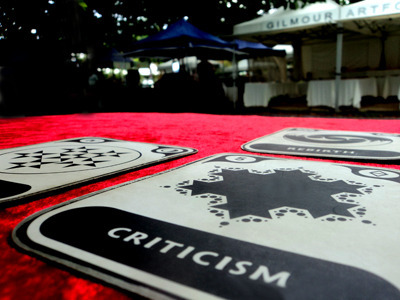Constructive Criticism
 “I don’t really believe in this kind of thing,” the Frenchman said as he waved his hand theatrically over the table.
“I don’t really believe in this kind of thing,” the Frenchman said as he waved his hand theatrically over the table.“Tarot, I mean, how can it work?” his face showed distain as he surveyed the cards spread out in front of him. I moved quickly to gather the cards into a pile and straightened the deck, holding it out to him with all the cards facing down.
“Just pick one card for the day,” I suggested, “just for fun, see what you get”
He looked at me sternly for a moment and then relaxed, gave a shrug and took the cards, mumbling slightly to himself as he shuffled. He chose one card from the deck and turned it over, his face becoming serious again as he studied it carefully.
“Criticism”, he announced and then paused, his mouth turned down at the corners. He seemed to be turning the idea over in his mind.
“Yes… well… I am French,” he reasoned, waving his hand again in an impatient gesture, “I can be critical, of course…”
Impressed by the accuracy of his chosen card, he examined the book, asking questions about how it was written. He later purchased a deck, keen to discover more about the Tarot. The following day he called out to me as I was on my way to lunch.
“Genius”, he exclaimed, “you’re a genius! Can you sign the book for me please?” I obliged, flattered and pleased that he was so happy with his new Tarot. As I watched him walk away I wondered about how we often criticise something when we don’t fully understand it and just what makes us do that…
The thing about new information is that it can threaten our status quo and we require a firm foundation within ourselves in order to be open to new ideas. I’ve often seen people pause out the front of my stall, glancing hesitantly up from reading my information board perhaps to see if I have any warts on my nose or if my broomstick is poking out from under the back of my dress.
The nervous ones hover, alternately looking away with the hope of finding something a few stalls further down to distract them, then looking back at me, their attention drawn to the cards, the symbols, the possibilities of the unknown. Those ones usually end up walking away, shaking their heads and muttering something like, “I don’t think I really want to know anyway…” They are happy with their belief system, their take on reality and they don’t want it challenged.
The most difficult people to read are the non-believers. They don’t communicate, their energy field is closed, often their arms are folded across their chests while their whole persona is saying “Yeh, go on, show me something good” They don’t last long in my chair.
When a person’s defences are raised so high it is exhausting to even attempt direct communication and a more subtle approach is required. So I urge them to take just one card and to reflect on its meaning for the rest of the day, hoping that the part of them that genuinely wants to grow, the part that made them sit down in the first place despite their attitude, will whisper to them just loudly enough that they can hear.
When we use criticism as a defence we effectively close the door to new knowledge and we have to ask ourselves exactly what we are protecting. In order to grow we need to take a good look at who we are and how we do things and see where our attitudes or behaviours require adjustment. If we continue to operate on the same beliefs and behaviours we have used in the past we will continue to get the same results.
If we want better opportunities, better relationships or a better cash flow then we need to create a new perspective, find a fresh approach and we need to be open to new ideas, including the realisation of where we may be sabotaging our potential.
The most successful artists, athletes and entrepreneurs are the ones who are not afraid to try new things and are willing to learn from their mistakes. If we are overly critical of ourselves when things don’t go as planned, then we quickly lose our enthusiasm to try again.
We all have moments when we criticise, when something or someone doesn’t live up to our expectations or we are unimpressed with the results of our efforts. However focusing on the way we think something should be cuts us off from truly experiencing it the way that it is and as personal development guru Byron Katie explains so well, “if you argue with reality you will lose, but only 100% of the time”
Next time you find yourself criticising, may I suggest you try giving a ‘critique’ instead - an impartial assessment of strengths and weaknesses, a list of alternative ideas and healthy, helpful suggestions about how improvements could be made.
For questions and tips about reading Tarot ~ Ask The Hoo
Published on January 28, 2013 02:39
•
Tags:
criticism, crop-circles, tarot, tarot-in-black-and-white
No comments have been added yet.
Misha Hoo's Blog
- Misha Hoo's profile
- 9 followers
Misha Hoo isn't a Goodreads Author
(yet),
but they
do have a blog,
so here are some recent posts imported from
their feed.



